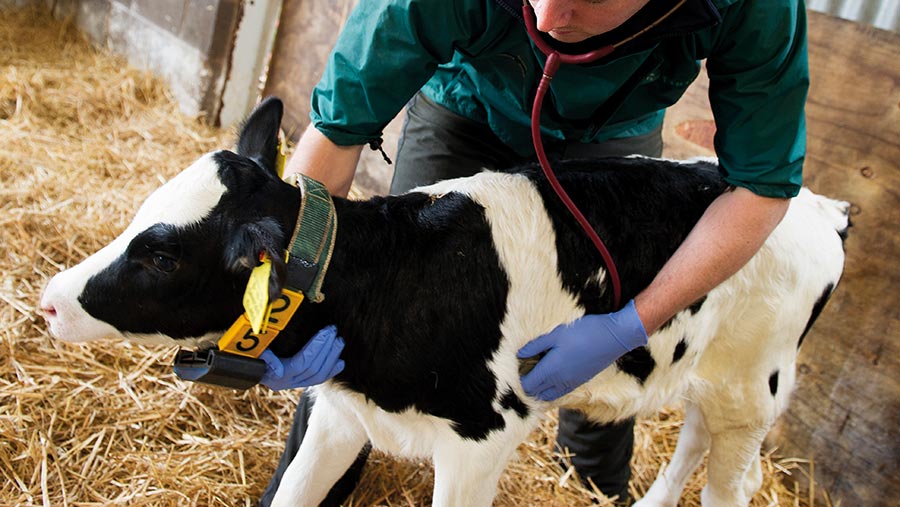
[ad_1]
As farm vets working in practice in the UK, we have an essential role in ensuring that farming is part of the solution to the climate crisis.
Vets are in the privileged position of working at the intersection of human, animal and environmental health, and, as trusted advisers, we are ideally placed to support our clients on their continued journey towards improved sustainability.
While there is a logical trend in developed countries towards “less and better”, the global demand for meat and dairy products is set to continue to increase, driven mainly by the aspiring middle classes in developing countries.
See also: Medicine Hub: What it is and how to use it
Livestock vets are integral to helping meet these demands by working with their clients so that farms are more productive, efficient and profitable, while embracing regenerative practices.
Understanding methane
There is a need to reframe the discussion, particularly around carbon and methane. We can never be carbon neutral without farming – the custodians of our soils are key to carbon sequestration.
Recent work from Oxford University has shown that the commonly used metric for measuring the effect of ‘global warming potential’ (GWP100) overestimates the impact of methane, because it assumes the gas is present in the atmosphere for at least 100 years.
Although methane is 28 times more potent than carbon dioxide as a greenhouse gas, it is broken down in the atmosphere after about 12 years. The new metric, GWP*, allows for this.
The need for methane reduction was one of the key outputs from COP26, with the UK committing to reduce methane outputs by 30% by 2030. This is not all from agriculture, but it is something we should try to understand so as to talk about it more openly.
Ruminants have been in a balanced biogenic cycle of methane for thousands of years, and so anything we can do to reduce methane outputs will quite quickly have an effect, as existing methane in the atmosphere is oxidised.
The headline is that the more efficient we can be in meat and milk production, the better it is for the planet.
Animal health and productivity
One area where farm vets can help farmers to be more sustainable is through disease control and eradication. Having healthy animals, free from disease, with the highest levels of welfare, will positively affect the productivity of any farm.
Recently, there have been schemes to encourage farmers to test for diseases, with the ultimate aim of eradicating them from the UK. As farm vets, we have been heavily involved in the BVDFree (bovine viral diarrhoea) scheme and Johne’s testing on dairy and beef farms.
These schemes are now an integral part of health plans, which are reviewed annually to continue to monitor and improve herd performance. Stringent biosecurity protocols are also important to ensure diseases are not brought onto farms.
For most flock health parameters, we can demonstrate an economic and environmental benefit.
Subsidised flock testing for abortion screening helps diagnose infectious causes of abortion. Vaccinations can be administered to minimise losses and maximise lamb output in subsequent years.
Tackling drug resistance
UK farms are continuously reducing antibiotics usage, which is helping to combat antimicrobial resistance.
Good animal husbandry is cited as the single most important factor in reducing antibiotics use. But other management practices, such as correct stocking density, good nutrition, vaccination protocols, effective ventilation in sheds and genetic selection can all be adopted to minimise the need for antibiotics.
The reduction in prophylactic antibiotics use has a key role and, over the past five-to-10 years, there has been a real shift from routine intramammary treatment with antibiotics at drying off to selective treatment based on milk recording data.
Anthelmintic resistance has become more common, particularly in the sheep sector, but integrated parasite management is now replacing blanket worming regimes. This considers many factors such as breed susceptibility, pasture management, grazing regimes, diagnostics (for example, faecal egg counts), and using only targeted antiparasitic treatments. This will reduce the risk and rate of resistance development.

© Paragon Veterinary Group
Breeding efficiency
Efficient reproduction is absolutely key to sustainable livestock systems, which means a more productive unit (more yield/kg of input), less wastage through involuntary culling, and ultimately a lower carbon footprint. Again, your vet has a key role to play in this.
Genetics and breeding can directly affect farm sustainability, with genomic indices – such as the recent EnviroCow and Feed Advantage (part of AHDB Dairy’s bull proofs) – helping breeders to select for more efficient and sustainable animals in the dairy herd.
Indices in the future will identify further traits associated with sustainability, such as methane production and healthy rumen microflora (biome).
Similarly, including health and welfare traits in the selection of breeding stock can also help to reduce antibiotics use.
Technology such as genomics assists with providing data to help with selection. Other technologies, such as in vitro fertilisation (IVF) or conventional embryo flushing, can lead to further gains being made.
This happens by dramatically increasing the intensity of selection, producing embryos from animals carrying desirable traits and transferring them into less suitable animals. This speeds up genetic improvement hugely within the herd and can offer significant progress in sustainable breeding goals in a short period.
So, there is a great deal we can do to positively affect climate change, and we can do it now – we have the tools and we have the knowledge.
[ad_2]
Source link